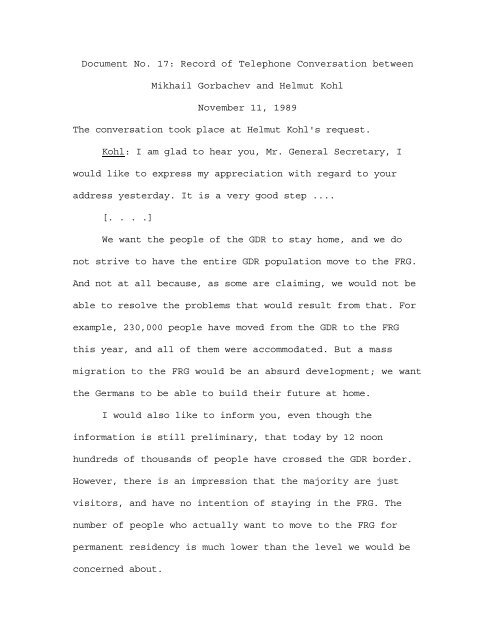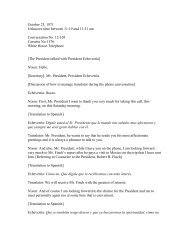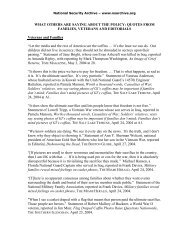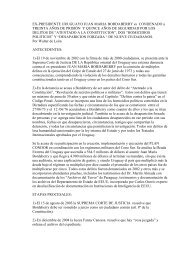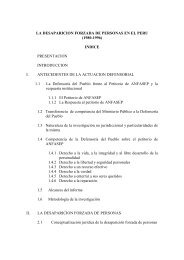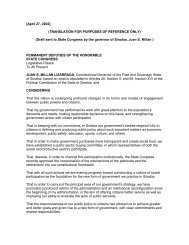Record of Telephone Conversation between Mikhail Gorbachev and ...
Record of Telephone Conversation between Mikhail Gorbachev and ...
Record of Telephone Conversation between Mikhail Gorbachev and ...
You also want an ePaper? Increase the reach of your titles
YUMPU automatically turns print PDFs into web optimized ePapers that Google loves.
Document No. 17: <strong>Record</strong> <strong>of</strong> <strong>Telephone</strong> <strong>Conversation</strong> <strong>between</strong><strong>Mikhail</strong> <strong>Gorbachev</strong> <strong>and</strong> Helmut KohlNovember 11, 1989The conversation took place at Helmut Kohl's request.Kohl: I am glad to hear you, Mr. General Secretary, Iwould like to express my appreciation with regard to youraddress yesterday. It is a very good step ....[. . . .]We want the people <strong>of</strong> the GDR to stay home, <strong>and</strong> we donot strive to have the entire GDR population move to the FRG.And not at all because, as some are claiming, we would not beable to resolve the problems that would result from that. Forexample, 230,000 people have moved from the GDR to the FRGthis year, <strong>and</strong> all <strong>of</strong> them were accommodated. But a massmigration to the FRG would be an absurd development; we wantthe Germans to be able to build their future at home.I would also like to inform you, even though theinformation is still preliminary, that today by 12 noonhundreds <strong>of</strong> thous<strong>and</strong>s <strong>of</strong> people have crossed the GDR border.However, there is an impression that the majority are justvisitors, <strong>and</strong> have no intention <strong>of</strong> staying in the FRG. Thenumber <strong>of</strong> people who actually want to move to the FRG forpermanent residency is much lower than the level we would beconcerned about.
I recently told you that we did not want adestabilization <strong>of</strong> the situation in the GDR. I am still <strong>of</strong>the same view. I do not know on what scale Egon Krenz reallyplans to carry out reforms. However, in a situation such asthey have now, the GDR leadership should act in a moredynamic way.I would like to repeat that I appreciate your contactingme in connection with these events. Next week, immediatelyafter I return from Pol<strong>and</strong>, I would like to give you a callagain if you do not have any objections, to discuss the newdevelopments with you.<strong>Gorbachev</strong>: That would be good. I recall how we discussedrelations <strong>between</strong> our two peoples, <strong>and</strong> general developmentsin Europe in the philosophical sense. As you can see, Mr.Chancellor, those discussions were not simple exercises inrhetoric. Deep changes are underway in the world. This alsoconcerns the East European countries. One more example <strong>of</strong>that is the beginning <strong>of</strong> the reform process in Bulgaria. Andchanges are happening even faster than we could have imaginedrecently.Of course, the changes could take different forms indifferent countries, <strong>and</strong> reach a deeper level. However, topreserve stability it is important for all sides to act in aresponsible way.
All in all, I think that the basis for mutualunderst<strong>and</strong>ing is improving. We are getting closer to eachother. And this is very important.[...] In particular, I recommended to Egon Krenz thatthe leadership <strong>of</strong> the republic should prepare reforms whilecarefully taking into account the mood <strong>of</strong> society, <strong>and</strong> on thebasis <strong>of</strong> an open dialogue with public forces, public movementsin the country.I underst<strong>and</strong> that all Europeans, <strong>and</strong> not only Europeans,are closely following developments in the GDR. This is a veryimportant point in world politics. But it is also a fact thatyou <strong>and</strong> I--the FRG <strong>and</strong> the Soviet Union--have even moreinterest in these developments both because <strong>of</strong> the history<strong>and</strong> because <strong>of</strong> the character <strong>of</strong> our relations today.In general, I can say that there is a certain kind <strong>of</strong>triangle forming now, in which everything has to bethought-out <strong>and</strong> balanced. I think that our relations todayallow us to do everything the way they should be done.Of course, any kind <strong>of</strong> change means a certaininstability. That is why, when I speak about preservingstability, what I mean is that we, on all sides, shouldtake steps that are carefully thought out in relation toeach other.
I think, Mr. Chancellor, we are experiencing a historicturn toward new relations, toward a new world. And we shouldnot allow ourselves to impair this turn by our awkwardactions, or, moreover, to push developments toward anunpredictable course, toward chaos, by forcing events. Thatwould be undesirable in all respects.That is why I take the words you have spoken in ourconversation today very seriously. And I hope that you willuse your authority, your political weight <strong>and</strong> influence tokeep others within limits that are adequate for the timebeing <strong>and</strong> for the requirements <strong>of</strong> our time.Kohl: I think that it is fortunate that relations<strong>between</strong> the USSR <strong>and</strong> the FRG have reached the high level <strong>of</strong>development that they have now. And I especially appreciatethe good personal contacts that have developed <strong>between</strong> us.In my opinion, our relations are beyond simply <strong>of</strong>ficialcontacts, they have a personal character. I believe thatthey could continue to develop like this in the future. Iam ready for that. I underst<strong>and</strong> that a personal relationshipdoes not change the essence <strong>of</strong> the problems, but it can maketheir resolutions easier.Coming back to the assessment <strong>of</strong> the situation in theGDR, I would like to mention that the problem now lies inthe realm <strong>of</strong> psychology. Honecker's course, which rejected
any reforms up until the end, put the new leadership <strong>of</strong> theGDR in a very difficult situation. Krenz's "team" now has tooperate under horrible time pressures, <strong>and</strong> this is where Isee the main problem. You are right, they need time todraft <strong>and</strong> implement the reforms. But how would you explainthis to the population <strong>of</strong> the GDR? [....][Source: Archive <strong>of</strong> the <strong>Gorbachev</strong> Foundation, Fond 1. Opis1. On file at the National Security Archive. Published in<strong>Mikhail</strong> <strong>Gorbachev</strong> i germanskii vopros: sbornik dokumentov 1986-1991. Moscow: Ves’Mir, 2006, pp. 247-250, Translated by Svetlana Savranskaya.]


